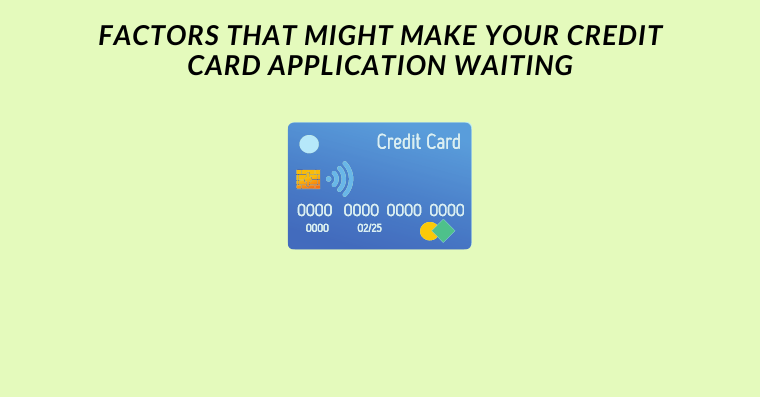Factors that Might Make Your Credit Card Application Waiting
If you’ve ever applied for a credit card and waited weeks or even months for a response, you know how frustrating it can be. Several factors can delay the approval of your credit card application, and understanding these factors can help you avoid the waiting game and get the credit you need more quickly.

We’ll take a look at some of the most common
factors that might cause your credit card application to be delayed.
Credit score
One of the primary factors that credit card issuers consider when evaluating applications is the applicant’s credit score. If your credit score is low or if you have a limited credit history, assess your application and decide whether you are eligible for the card, the issuer might need more time.
To avoid delays due to your credit score, check
your credit report before applying for a card. Every year, the three major
credit reporting agencies will provide you with a free copy of your credit
report ( Equifax, Experian, and TransUnion). Examine your report thoroughly and
challenge any errors you find. If your credit score is low, consider taking
steps to improve it before you apply for a new credit card.
Income
Another key factor that credit card issuers consider is your income. They want to ensure you can repay any debt you incur on the card. If your income is low or if it doesn’t match the credit limit you’re requesting, the issuer may need to take additional time to evaluate your application and determine whether you’re a good candidate for the card.
To avoid delay due to income, make sure you’re
providing accurate and up-to-date information on your application. If you’ve
recently started a new job or received a raise, be sure to include this information
in your application. You may also want to consider applying for a card with a
lower credit limit if you’re concerned that your income may be an issue.
Existing debt
Credit card issuers may also look at your existing debt when evaluating your application. If you have a lot of outstanding debt or if you’ve recently missed payments on other debts, the issuer may be more hesitant to approve your application.
To avoid delays due to existing debt, consider
paying off some of your outstanding debt before you apply for a new credit
card. This can help improve your credit score and make you a more attractive
candidate for the card. You may also want to consider applying for a card with
a lower credit limit if you’re concerned about the debt-to-income ratio.
Identity verification
Credit card issuers may also need to verify your identity before approving your application. This can take additional time if there are any discrepancies in the information you provide or if the issuer needs to request additional documentation from you.
To avoid delays due to identity verification,
make sure you’re providing accurate and up-to-date information on your
application. Double-check your social security number, address, and other
personal information to ensure that there are no errors. You may also want to
consider providing additional documentation upfront, such as a copy of your
driver’s license or passport, to help speed up the verification process.
Conclusion
Several factors can cause delays in the
approval of your credit card application. These include issues with your credit
score, income, existing debt, identity verification, fraud prevention, error or
incomplete information on the application, applying for too many credit cards
at once, and applying for the wrong type of card. Addressing these factors
before you apply can improve your chances of getting approved more quickly and
with less hassle.
Read More: What Things Should I Look For While Selecting A Credit Card?



Comments
Post a Comment